LONDON: Karim Khan, chief prosecutor of the International Criminal Court, has urged judges to reject legal challenges disputing the court’s power to issue arrest warrants for Israeli nationals, confirming the warrants are well within the ICC’s purview.
Khan applied for warrants in May for the arrest of Israeli Prime Minister Benjamin Netanyahu and Defense Minister Yoav Gallant, and three Hamas leaders — Yahya Sinwar, Ismail Haniyeh, and Mohammed Deif — on charges of war crimes and crimes against humanity.

Karim Khan, chief prosecutor of the International Criminal Court. (AFP/File)
Haniyeh has since been killed in a suspected Israeli strike in Tehran, while unconfirmed reports suggest Deif was killed in an Israeli strike in Gaza. Sinwar, meanwhile, has been appointed as the militant group’s new political chief.
“It is settled law that the court has jurisdiction in this situation,” Khan wrote in court filings made public on Aug. 23, dismissing legal arguments filed by over 60 governments, organizations and individuals opposing the warrants.
The court’s Pre-trial Chamber was expected to issue a ruling on the warrants by the end of July, but the many submissions have slowed the process. Khan warned that “any unjustified delay in these proceedings detrimentally affects the rights of victims.”
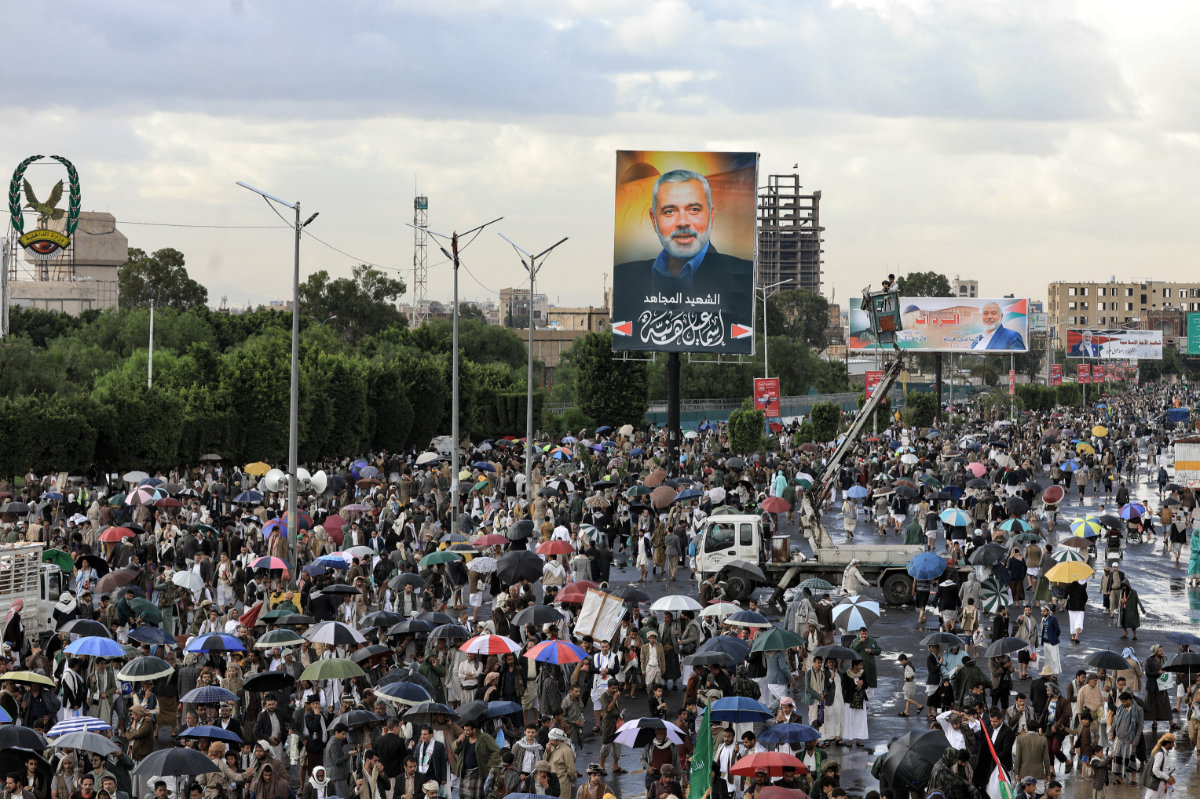
Yemenis lift a large portrait of Hamas political leader Ismail Haniyeh during a rally in Sanaa in support of the Palestinians. Haniyeh was assassinated in Tehran, presumably by Israelis. (AFP)
Khan requested the arrest warrants to hold accountable those who are alleged to have committed war crimes and crimes against humanity during the Hamas-led Oct. 7 attack on southern Israel and Israel’s retaliatory operation in the Gaza Strip.
However, in early June, the UK government requested permission to file an “amicus curiae” brief on whether a provision of the 1993 Oslo Accords peace deal could overrule the ICC’s jurisdiction over Israeli nationals.
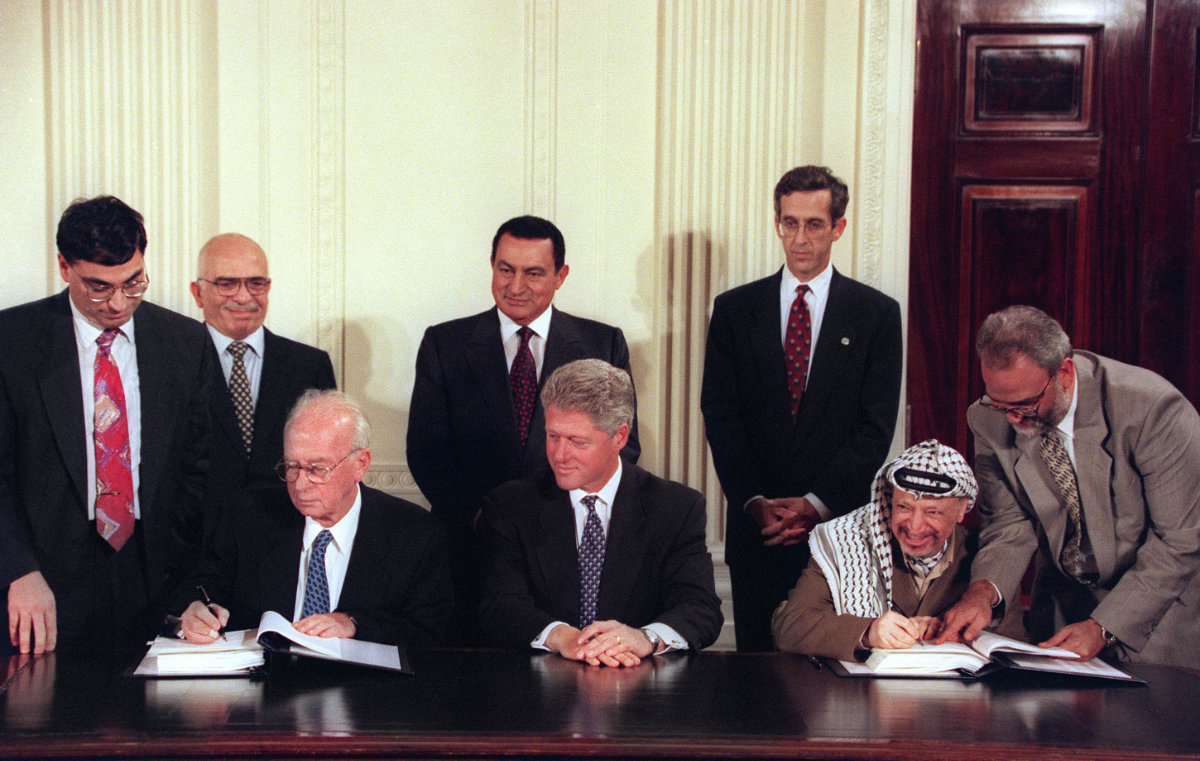
On September 28, 1995, Israeli Prime Minister Yitzhak Rabin (2nd-L) and PLO Chairman Yasser Arafat (2nd-R) signed a Palestinian autonomy accord in the West Bank in what has become known as the Oslo Accord. (AFP/File)
As part of the Oslo Accords, the Palestinian Authority agreed it does not have criminal jurisdiction over Israeli nationals. In his 49-page legal brief, Khan said the chamber considered the observations on the Oslo Accords to be an issue of “potential relevance.”
Other governments, including Germany, followed suit, with several also arguing the ICC should wait for Israel to conclude its own internal investigation into the allegations.
In his Aug. 23 legal brief, Khan rejected Israel’s claim that it is carrying out its own investigation into alleged war crimes. He argued that “the available information does not show that Israel is investigating substantially the same conduct as the ICC.
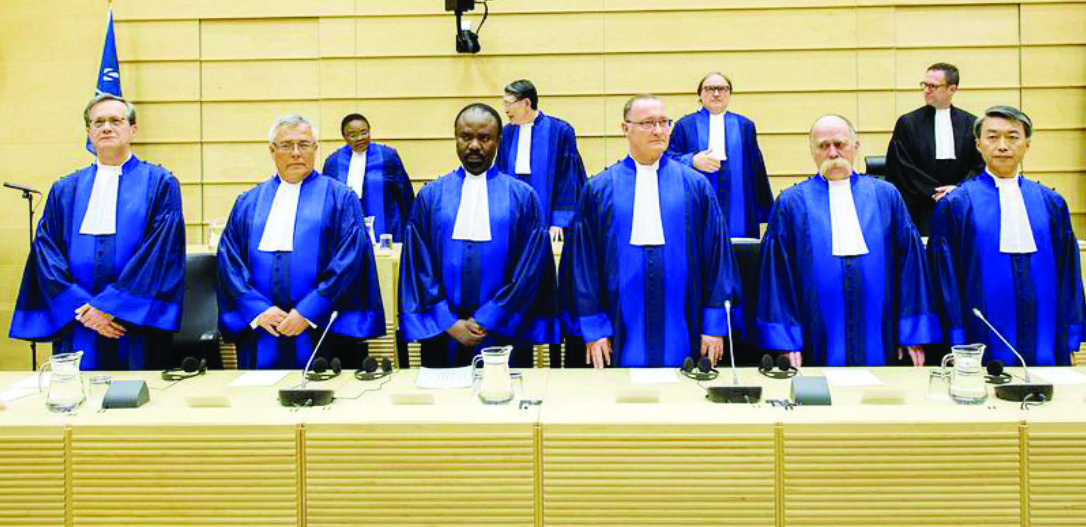
Several governments have pushed for the ICC to wait for Israel to conclude its own internal investigation into war crimes charges raised before the court. (Supplied)
Having initially led the charge against the ICC’s arrest warrants under its previous Conservative administration, Britain’s new Labour government dropped the Oslo challenge in late July, despite pressure from the US and Israel, neither of which is a signatory to the ICC.
Kenneth Roth, the former executive director of Human Rights Watch, says the right of Palestinians to prosecute war crimes against them “cannot be negotiated away.”
He said a ruling in July by the International Court of Justice, which deemed Israel’s occupation and annexation of the Palestinian territories to be illegal, addressed the argument as to whether the Oslo Accords mean the Palestinians have waived their rights.

A general view shows the land of the Palestinian Kisiya family in the Al-Makhrour area of Beit Jala in Bethlehem, which was seized by Jewish landgrabbers, reportedly aided by Israeli authorities. (AFP)
“It cited Article 47 of the Fourth Geneva Convention, which says negotiations between occupier and occupied cannot deprive people of rights under the convention — a wise precaution given inherent power imbalances,” Roth told Arab News.
“The court was addressing the issue of Israel’s illegal settlements, but the same logic applies to Palestinians’ right to prosecute war crimes. That is not a right that can be negotiated away, meaning that the recognized state of Palestine has the right to confer that jurisdiction as needed to the International Criminal Court.”
Hamas led a surprise cross-border attack on southern Israel on Oct. 7, killing at least 1,100 people and taking a further 250 hostage — most of them civilians. Israel retaliated with a bombing campaign and ground offensive against the Hamas-controlled Gaza Strip.

Family members and supporters of hostages who were kidnapped by Hamas militants during their deadly attack on southern Israel on October 7, 2023, have been holding continuous protest actions in an effort to bring back the hostages. (REUTERS)
Since the Israeli operation began, at least 40,400 Palestinians have been killed, according to Gaza’s health ministry, civilian infrastructure has been reduced to rubble, and more than 90 percent of the enclave’s population has been displaced.
Israel, which launched its Gaza mission in the wake of the Oct. 7 attack with the stated aim of destroying Hamas and other militant groups, insists it does not target civilians, instead accusing Palestinian militants of using civilians as human shields.
Commenting on the other legal challenge being brought against the ICC, Roth criticized the German government’s argument that the court should wait for Israel to end its operation in Gaza before pursuing arrest warrants
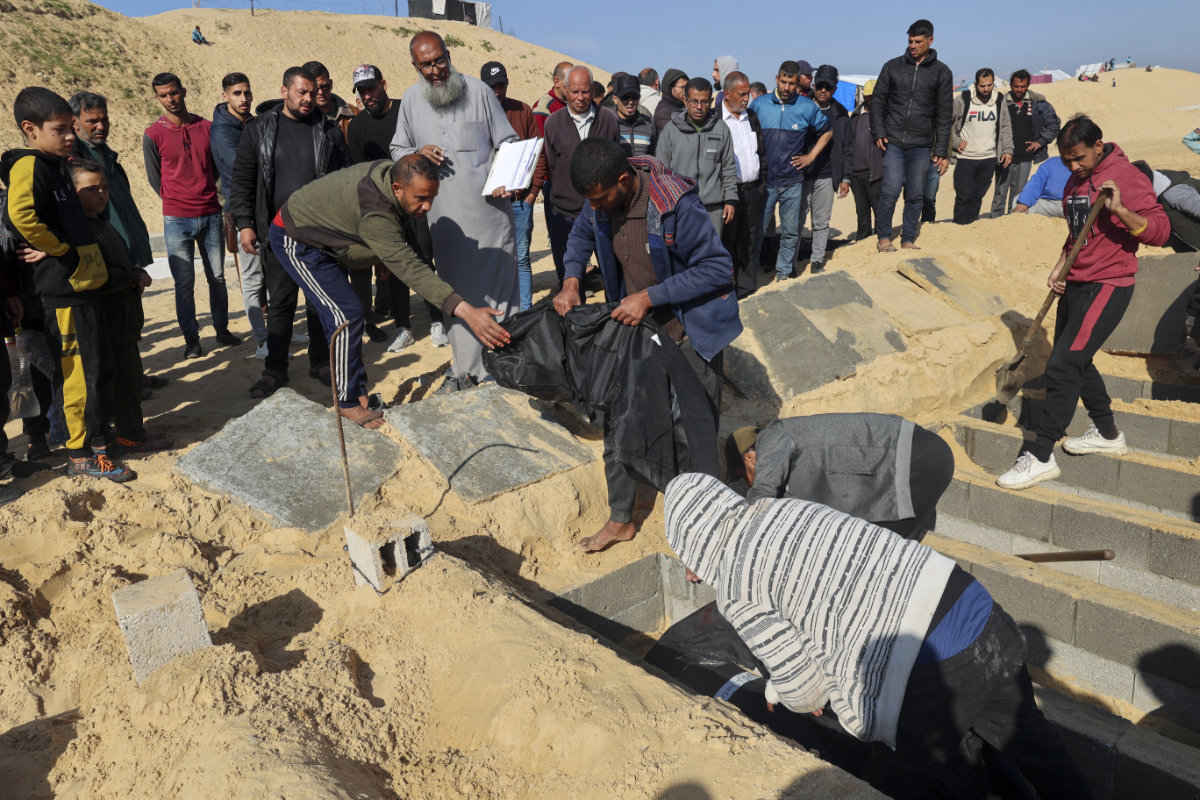
Palestinians bury their dead at a cemetery in Rafah, southern Gaza Strip, in this picture taken on February 21, 2024. Continuing Israeli strikes have killed at more than 40,400 Palestinians since Oct. 7, 2023. (AFP Photo/File)
“The German government has gone so far as to claim that the ICC should not prosecute any Israeli while the war in Gaza continues because it is too difficult for Israeli prosecutors to work right now,” he said.
“That is an argument that Germany notably did not make when Putin was charged,” he added, drawing a comparison with attitudes to the arrest warrant issued for Russian President Vladimir Putin for the alleged abduction of Ukrainian children.
“More to the point, it is wrong. Military prosecutors (around) the world operate during wars.”
For Roth, waiting until the fighting has ended would only encourage further human rights violations. “No one believes that the prosecution of war crimes should wait until all fighting ceases,” he said. “That would only encourage more war crimes.”
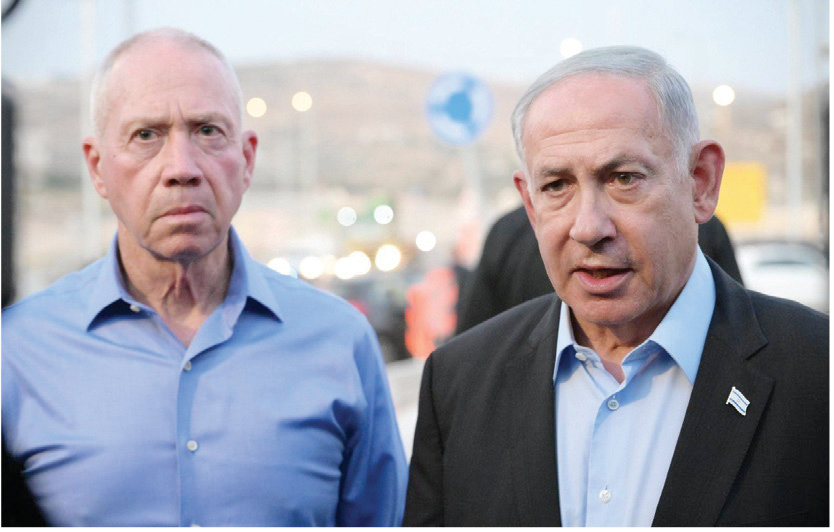
Israeli Prime Minister Benjamin Netanyahu and Defense Minister Yoav Gallant. (AFP)
He added: “In any event, Israeli prosecutors have been on notice for months that Netanyahu and Gallant were being investigated for their starvation strategy in Gaza, but there has been no public notice of any Israeli investigation of them.
“That is consistent with the longstanding Israeli practice of never prosecuting senior Israeli officials.”
The arrest warrants for Netanyahu and Gallant specifically allege the two Israeli ministers bear responsibility for “starving civilians as a method of warfare” in the Gaza Strip by obstructing the delivery of humanitarian relief.
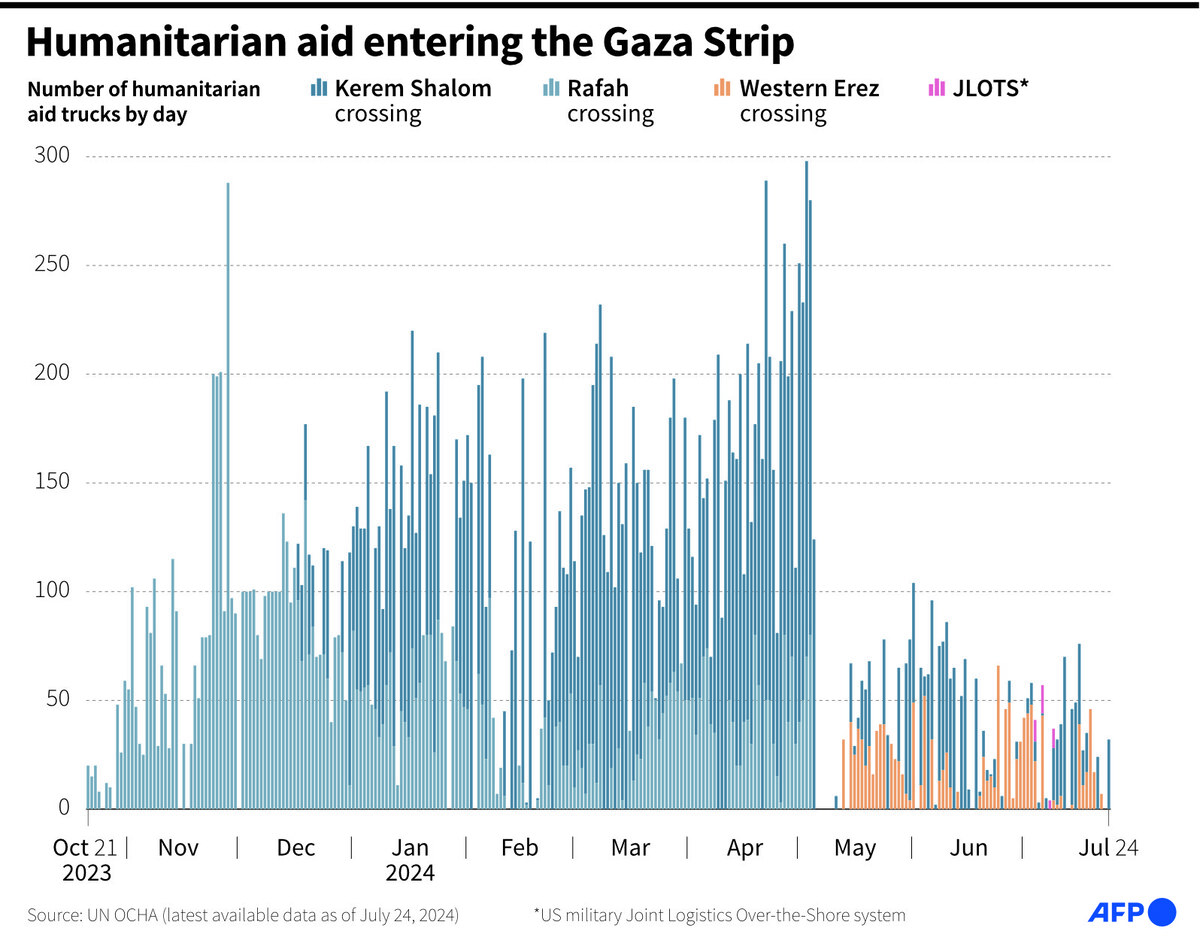
Infographic showing the drastic drop in hurelief aid entering Gaza. Israel has been accused of obstructing the entry of humanitarian relief as part of a systematic effort to starve Palestinians in the enclav. (AFP/File)
Another legal objection to the warrants concerns equating the actions of Hamas with those of Israel. The German government has rejected any comparison between the two, stressing Israel’s “right and duty to protect and defend its people.”
Nevertheless, if an arrest warrant is issued, Germany, like other ICC member states, would be legally obliged to arrest the two Israeli leaders if they were to enter the EU country.
Despite the current impediments, Roth is hopeful that justice will be delivered to the victims of the Israel-Hamas conflict.
“It may still take a month or two for the ICC judges to sort through these arguments, but I anticipate the arrest warrants will be issued in the reasonably near term,” he said.
“At that stage, no one charged will be able to travel to any of the 124 ICC member states which have a duty to arrest them. That lays a foundation of hope that we will see justice done.”
































